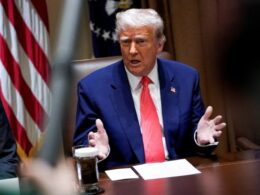Good morning. What a week it’s been! Thanks to Donald Trump, waking up and checking my financial portfolio has eliminated all need for any other thrill-seeking activity. Wall Street stocks sold off again yesterday, paring back gains from a rally after the US president announced a pause on most tariffs. Indian markets open today after yesterday’s holiday — let me know how you fared.
In today’s newsletter, we look at how the country’s smaller towns are becoming hot new markets for ecommerce companies. But first, Chinese electric-car manufacturer BYD does not get permission to manufacture, as India leans away from China and towards the US in the trade war.
Bye Bye BYD
This week commerce minister Piyush Goyal said Chinese electric-car maker BYD would not be allowed to invest in manufacturing in India. This is markedly different from the welcome he extended to Elon Musk’s Tesla just last month to invest and make its cars locally. The contrasting messages give a clear indication of where India’s trade preferences lie.
This isn’t the first time India has rebuffed BYD. Just last year, the government rejected its proposal to partner with a local company and invest $1bn. “We need to be convinced they will work by the rules of the game,” Goyal said on Sunday. It was unclear if he was referring to the company or the country, especially as he went on to criticise China’s “unfair trade practices” such as dumping steel and other products. “We have to be cautious about who we allow to invest in the country,” he added, stressing India’s strategic and security interests.
Goyal has been particularly vocal about China in the past week, blaming it for the tariff tizzy that the world is currently in. India is setting up an import monitoring group to check trade diversions from Asian countries that Trump has targeted with higher tariffs.
China, on the other hand, seems to be looking to India for support in the face of Trump’s trade aggressions. Last week, China’s leader Xi Jinping told Indian president Droupadi Murmu that the two countries should work more closely together, calling it a “dragon-elephant tango”. Earlier this year, it certainly looked like there was some progress in bilateral relations, with a deal reached over the border dispute after years of heightened tensions. This raised hopes that the government would ease restrictions on Chinese investments.
But that was before Trump’s bazooka of tariffs. India now senses a greater economic opportunity in allying with the US over China. Companies such as Apple are turning to their India operations to counter the impact of the 125 per cent tariffs on manufacturing in China. Talking up concerns about China “dumping” products will also help Goyal with the other trade deals he is negotiating, most notably with the UK and the EU, as countries use this opportunity to diversify their supply chains.
In clearly throwing our lot in with the US, the government is also hoping the prime minister’s friendly relationship with Trump will help with some sticky points of negotiation. But if the events of the past 10 days are anything to go by, Trump has proved himself to be nothing other than unpredictable, even to those closest to him. How much Narendra Modi can depend on his “dear friend” Donald is anyone’s guess.
Join Unhedged’s Robert Armstrong and other FT experts on April 23 for a subscriber-only webinar, as they break down how Trump’s policies are reshaping markets. Register here.
Recommended stories
-
Who blinked first? Trump did. What made him change his mind on Wednesday, and what does the tariff pause mean for global trade?
-
China’s “national team” is bolstering stock markets with massive co-ordinated share buying.
-
The US has revoked more than 500 student visas.
-
Byju’s creditors have sued its co-founders and strategy chief for allegedly “masterminding the theft” of $533mn.
-
Robert Armstrong asks: what makes a pair of trousers look fascist?
-
Where is the coolest food in Japan? In the convenience store!
Small town, big market
Meesho, one of India’s fastest growing online retailers, is gearing up for an initial public offering later this year. Founded by two college friends from Delhi, Vidit Aatrey and Sanjeev Barnwal, the start-up brings ecommerce to India’s smaller towns. It focuses on selling unbranded and cheaper apparel, furnishings and other household goods to nearly 200mn consumers.
Meesho’s customers are in markets that the likes of Amazon and Flipkart have yet to penetrate significantly, but that does not mean these multinational giants are not eyeing them. India’s next big growth in ecommerce and “quick commerce” — the magical service of under-30-minute delivery that has excited investors and consumers alike — will be in the towns that Meesho serves. Last month, Amazon announced that it was expanding its grocery delivery service to more than 170 locations in India, including places such as Gorakhpur, Chittoor and Ambala. Quick commerce groups Blinkit and Swiggy Instamart are also rapidly adding “dark” stores in small town India.
Several factors account for this push. Rural and semi-urban consumption in India grew much higher than urban consumption in 2024. Current meteorological predictions suggest another year of normal monsoons, which means these agriculture-based geographies will probably have more money to spend. With cheap telecoms rates, the internet and social media have democratised information and getting customers to try a new channel of consumption is not as difficult as it used to be. Meesho has put in the hard work of getting non-urban users on board. It now has to figure out a way of keeping them loyal, even when the companies with big pockets come knocking with their big discounts.
Go figure
India’s central bank cut the repo rate by 0.25 per cent on Wednesday, despite the overhang of Trump’s tariffs and other economic uncertainties. Here are some key numbers from the Reserve Bank of India’s announcement.
Read, hear, watch
I am leaving for Thailand this weekend*, and am preparing by catching up on the latest season of the mega-hit White Lotus. This season is set in the plush, tropical wonderland of Koh Samui (where I will be for part of my trip too), where a bunch of rich people have arrived at a luxury resort. Class tensions are highlighted and, of course, someone will die (not a spoiler, just the basis of the show!)
Three seasons in, loyal viewers are by now primed from the first scene to try to figure out who looks like a potential murderer and who will be the likely victim(s). There is a wealthy investment banker, hounded by calls from journalists about a shady deal from his past, his family of three squabbling (almost) adult children, a trio of middle aged women on a “girls’ trip”, and a couple of pairs of that classic combination — older rich men and their young girlfriends. As preparation for my trip, this was perhaps the wrong show for me to watch; I am already having nightmares about encountering cobras, pythons and monitor lizards. (Murderers I can take, but this is “too much nature” for this city slicker).
I have lots of reading planned, but none of it will help me understand tariffs and trade wars better. For that, here is a list.
*While I am away on holiday, the next two editions of India Business Briefing will be written by the FT’s Asia editor Robin Harding. Is there a greater joy than upward delegation?
Buzzer round
Which is the world’s best selling spirits brand that rode into fame on the back of TV dramas and pop music?
Send your answer to indiabrief@ft.com and check Tuesday’s newsletter to see if you were the first one to get it right.
Quick answer
On Tuesday, we asked: What do you think of Trump’s tariffs: sheer genius or complete insanity?
Here’s how you responded. Sheer genius, it is not!

Thank you for reading. India Business Briefing is edited by Tee Zhuo. Please send feedback, suggestions (and gossip) to indiabrief@ft.com.
Source link









